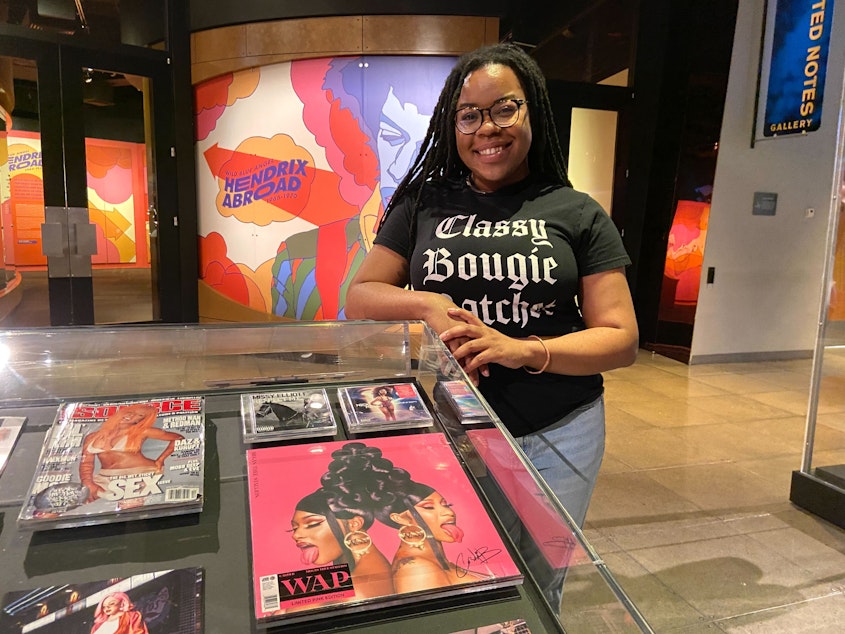At MoPOP, hip-hop feminism is on the mic

We've got a birthday to celebrate: Hip-hop is turning 50 this summer.
Even though the roots of the genre can be geographically traced back to the Bronx, hip-hop music and culture has undoubtedly shaped American culture broadly, and has global influence.
To celebrate, Seattle’s Museum of Pop Culture is hosting Freedom Flows, A Juneteenth Event Honoring 50 Years of Hip-Hop.
They’ll be premiering a new pop up exhibit: "My Mic Sounds Nice: Hip-hop feminism in history." As part of that, there’s a new, online hip-hop collection vault filled with digital artifacts.
KUOW arts and culture reporter Mike Davis caught up with MoPOP guest curator Adeerya Johnson, a hip-hop feminist scholar who's behind the new exhibit and the vault.
Johnson's work as a scholar and curator has been influenced by Joan Morgan, a journalist who coined the term "hip-hop feminist." Morgan's work has explored the ways Black women connect to hip-hop music and culture, while also dealing with contradictions within the community.
Sponsored
"We understand how in the early 1990s and 2000s, we've seen a lot of video vixens and how a lot of folks may assume that they're being objectified," Johnson said. "Or, they may be...experiencing some form of objectification within hip-hop, or even just the lyrics in the ways that a lot of men talk about women in hip-hop. But it's this idea that we still love listening to that music."
Dirty South feminism, Johnson says, creates of conversation around how Black women have been engaging in hip-hop, and what it means to grow up and live in the South through a feminist lens.
"I'm taking that perspective of, OK, there are these really great areas of hip-hop that can be problematic, but how do Black women navigate through that and find their place?'"
"My Mic Sounds Nice," which pays homage to the Salt-N-Pepa song of the same title, split into three eras.
Check 1, the first part of the exhibit, showcases artifacts reflecting the early years of Black women's emergence within hip-hop culture, like photographs of MC Sha-Rock, who's often considered the "first female rapper" or MC.
Sponsored
Check 2 stretches from the 1990s to 2000s, when rappers like Lil' Kim and groups like H.W.A. challenged the status-quo around how female sexuality and pleasure were discussed in hip-hop.
Check 3 addresses how contemporary artists like Nicki Minaj and Cardi B use not just their lyricism, but also their fashion, hair, and music video iconography to communicate the themes of their music.
For Johnson, "My Mic Sounds Nice" is all about amplifying the achievements and creativity of Black female hip-hop artists in the ears and eyes of fans, and challenging misconceptions.
"There's no singular Black woman and how she chooses to be — we all are different," Johnson said. "We all dress differently, we have different thoughts, but...just give us an opportunity to speak and give us a stage to do what we do best and, you know, show some respect."
Freedom Flows: A Juneteenth Event Honoring 50 Years of Hip-Hop will be hosted at the Museum of Pop Culture on Monday, June 19 at 7 pm. Tickets are available for those 21 and over on MoPop's website.
Sponsored
Listen to the full segment by clicking the play button at the top of this story.





